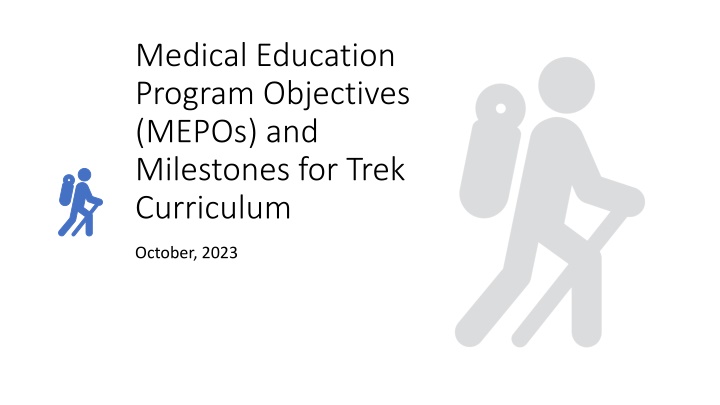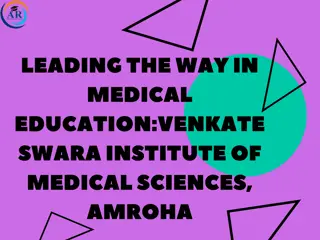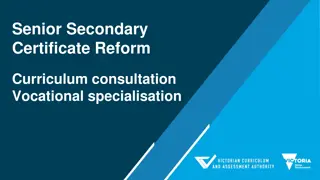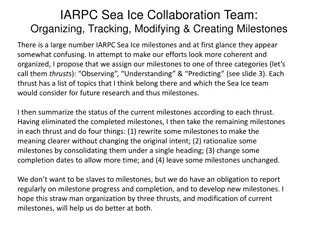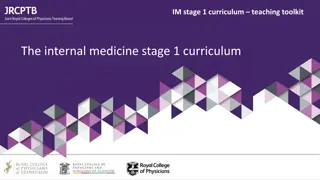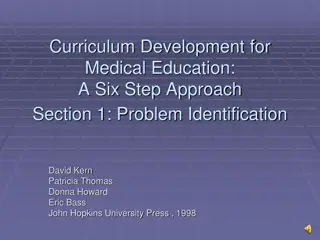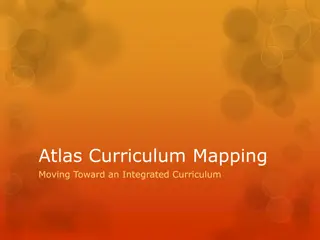Medical Education Program Objectives (MEPOs) and Milestones for Trek Curriculum October 2023
The Medical Education Program Objectives (MEPOs) and Milestones for the Trek Curriculum in October 2023 focus on guiding principles for assessment and setting milestones to ensure student success in various phases of the curriculum. Detailed templates with definitions and descriptions of outcomes, milestones, and red flags are provided. The content emphasizes the importance of behavioral anchors, avoiding comparisons among students, and addressing concerning behaviors promptly.
Uploaded on Sep 09, 2024 | 2 Views
Download Presentation

Please find below an Image/Link to download the presentation.
The content on the website is provided AS IS for your information and personal use only. It may not be sold, licensed, or shared on other websites without obtaining consent from the author.If you encounter any issues during the download, it is possible that the publisher has removed the file from their server.
You are allowed to download the files provided on this website for personal or commercial use, subject to the condition that they are used lawfully. All files are the property of their respective owners.
The content on the website is provided AS IS for your information and personal use only. It may not be sold, licensed, or shared on other websites without obtaining consent from the author.
E N D
Presentation Transcript
Medical Education Program Objectives (MEPOs) and Milestones for Trek Curriculum October, 2023
Guiding Principles Assessment is a means of making a claim/judgement about a learner. A milestone should therefore be claim that we want to make about a student s ability at a specific transition point. Milestones are only included if they are necessary for a student to succeed in the next phase of the curriculum. A milestone is considered the bare minimum rather than aspirational goals. All milestones must have associated assessments/data to back them up. Milestones should use behavioral anchors that are observable and avoid language that compares students to each other. Red flags are not just the absence of attaining a milestone, but rather a concerning behavior that needs response at any point in medical school. Many are related to professionalism as that is a foundational attribute for many of the other outcomes.
Template with definitions/ descriptions of different aspects of our outcomes and milestones Red Flags Prior to Core Clinical Experiences Prior to Acting Internships Goal Outcome Description of the outcome expected by graduation in some cases may be same wording as outcome or may have more detail/description than the outcome phrase Milestone that needs to be met prior to starting Acting Internships in the Alpine Milestone that needs to be met prior to starting the LIC in the Foothills MEPO Descriptive bullets that provide more detail and context for the Prior to Foothills Milestone These bullets should all be assessable List of behaviors that are concerns for this particular outcome not meant to be exhaustive or exclusive Descriptive bullets that provide more detail and context for the Prior to Alpine Milestone These bullets should all be assessable Descriptive bullets that provide more detail and context for the Goal Behavior These bullets should all be assessable Short phrase summarizing the outcome These are examples and not an exhaustive list and represent behaviors that would need immediate correction at any point in medical school. List of methods of assessment for this milestone List of methods of assessment for this milestone List of methods of assessment for this milestone
Red Flags Prior to Core Clinical Experiences Prior to Acting Internships Goal Outcome Demonstrate behaviors that convey compassion, empathy, respect, and inclusion. Hold self and others accountable to a culture of inclusion. Encourage others to express opinions/ideas and incorporates them into plans as appropriate. Demonstrate compassion/ empathy and respect for self and others. No patten of consistent Red Flags No patten of consistent Red Flags Interaction Lapses Does not demonstrate empathy, compassion, respect, and/or inclusion Does not maintain professional appearance/attire/ demeanor Does not communicate with courtesy and respect Inadequate rapport with patients or families Inadequate rapport with fellow students, faculty or other team members Poor verbal/non-verbal communication Inappropriate use of social media Bullying, discrimination, sexual harassment MEPO Commitment #1 Describe/list questions that one would ask of others to discern whether they are feeling heard, understood, and respected. Demonstrate compassionate body language when evaluated: position whole body to face the speaker, open body language, leaning toward speaker. Describe the steps to develop self-compassion (as described by 12-item self-compassion scale) Encourage others to express opinions and ideas in classroom setting. Demonstrate active listening skills In an interaction, recognize whether the other person feels heard, understood, and respected. Employ questions when appropriate Begin to incorporate compassionate body language in daily practice. Demonstrate self-compassion Encourage others to express opinions and ideas in multiple arenas. Actively incorporate others' views, culture, and background into plan of action Consistently recognize whether the other person feels heard, understood, and respected, uses questions, and adapts behavior to improve interactions. Consistently incorporate compassionate body language in daily practice. Periodically reflect and assess self-compassion; engage in deliberate practice Compassion/empathy/ respect These are examples and not an exhaustive list and represent behaviors that would need immediate correction at any point in medical school. OSCE Preceptor assessment Reflection 360 evaluation Self-compassion scale Preceptor assessment Small group assessment Reflection OSCE Supervisor assessment Reflection 360 evaluation
Red Flags Prior to Core Clinical Experiences Prior to Acting Internships Goal Outcome Demonstrates professional behaviors that build trust including humility, reliability, and integrity. No patten of consistent Red Flags No patten of consistent Red Flags Integrity and Involvement Lapses Does not display Humility (Discernment of own limitations and willingness to ask for help when needed), Integrity (Benevolence:, honesty, and truthfulness),or Reliability (Working conscientiously and showing predictable behavior). Requires repeated reminders to fulfill responsibilities (assignments and attendance) Cannot be relied upon to complete tasks Inadequate or untimely communication Misrepresents or falsifies information Disregards directives, policies, or processes MEPO Commitment #2 Describe standards for professional behavior Keep commitments to others, take responsibility for actions; and show consistency between words and actions Open with information; share readily Understand and identify the information needed to clarify a situation; notice inconsistencies; make recommendations for decisions Work in groups collaboratively and consider all points of view. Keep commitments to others, take responsibility for actions; and show consistency between words and actions Open with information; share readily Make a systematic comparison of various courses of action, weigh priorities; Make decisions based upon analysis Incorporate patient experience, input and psychosocial factors in decision making process Behavior honors both self and profession Keep commitments to others, take responsibility for actions; and show consistency between words and actions; model values and standards for others Open with information; shares readily Synthesize multiple options and discerns best course of action in complex situations Professional behaviors These are examples and not an exhaustive list and represent behaviors that would need immediate correction at any point in medical school. Preceptor assessment Small group assessment Reflection Preceptor assessment Reflection 360 evaluation Supervisor assessment Reflection 360 evaluation
Red Flags Prior to Core Clinical Experiences Prior to Acting Internships Goal Outcome Apply ethical values to service of individual patients, communities, and the public at large by consistently demonstrating behaviors that uphold ethical and legal standards. No patten of consistent Red Flags No patten of consistent Red Flags MEPO Commitment #3 Define core ethical concepts in healthcare Apply an ethical framework to hypothetical cases with guidance List and define core legal requirements for health systems practice and policy Describe historically and ethically significant cases and problems Define legal standards Apply an ethical framework to actual patient cases with guidance Recognize concepts involving justice in clinical cases with guidance Demonstrate behaviors that uphold the core legal requirements for health systems practice (with guidance) Demonstrate behaviors that uphold ethical and legal standards Encourage peers to uphold ethical and legal standards Independently identifies ethical and legal issues in the delivery of healthcare Demonstrate ethical practice when engaging with community Demonstrate behaviors that uphold the core legal requirements for health systems practice Hold others accountable to ethical and legal standards Integrity and Interaction Lapses Imposes personal values on others Does not abide by core ethical concepts in healthcare Disregards ethical and legal standards Violates ethical boundaries Dismissive of the importance of ethics in patient care and research Privacy and/or confidentiality violations Ethical Values These are examples and not an exhaustive list and represent behaviors that would need immediate correction at any point in medical school. Assignments MCQ Preceptor assessment Reflective writing 360 evaluation Small group assessment Supervisor assessment Reflective writing 360 evaluation
Red Flags Prior to Core Clinical Experiences Prior to Acting Internships Goal Outcome Develop an individualized identity as a physician, built on the shared values of the profession. No patten of consistent Red Flags No patten of consistent Red Flags MEPO Commitment #4 Recognize conflict(s) between personal and professional identities and values Describe how local culture can alter personal and professional identity. Describe resources for gathering information on career choice Express an initial vision/values for career Reflect on how peers, mentors and role models influence one's professional identify. Describe how the culture of healthcare systems can impact professional identity. Develop an integrated identity where self is defined independently of others AND reflects how one s self will be manifest in professional standards Integrity and Introspection Lapses Does not acknowledge that personal identities and values influence perception of professional standards. Imposes personal identities and values on others Not sensitive to another person s needs Demonstrates arrogance Abusive or critical during times of stress Professional Identity Formation These are examples and not an exhaustive list and represent behaviors that would need immediate correction at any point in medical school. Assignments Reflective writing Reflective writing Small group assessment Reflective writing Small group assessment
Red Flags Prior to Core Clinical Experiences Prior to Acting Internships Goal Behavior Advocate for the well-being of patients, families, communities, and populations. No patten of consistent Red Flags No patten of consistent Red Flags MEPO Commitment #5 Demonstrate ability to describe a community s determinants of health Recognize the structural factors that influence the health of communities and/or populations Recognize various levels and forms of advocacy Identify key stakeholders involved or impacted by a change management plan Act in the patient s best interest Demonstrate ability to address a community health issue (determinant of health) in collaboration with a community partner (service- learning curriculum) Describe advocacy actions that could be used to address the structural factors influencing the health of communities and/or populations. Demonstrate ability to communicate with and effectively manage key, involved stakeholders in a change management plan Consistently integrate the determinants of health into analyses of health issues (structural competency). Consistently apply the socioecological model to identify possible advocacy actions Communicate with and effectively manage key stakeholders as part of routine practice, when indicated Interaction Lapses Does not advocate for patients and/or communities despite direction. Unable to identify key stakeholders or ineffective communication with key stakeholders with guidance. Does not recognize or manage conflicts of interest (self and others) Advocacy These are examples and not an exhaustive list and represent behaviors that would need immediate correction at any point in medical school. Assignments Reflective writing Reflective writing Small group assessment Service learning project Reflective writing Small group assessment
Red Flags Prior to Core Clinical Experiences Prior to Acting Internships Goal Outcome Completea patient-centered history integrating hypothesis-driven questioning, secondary sources of data, and patient s context to make history taking comprehensive, accurate and efficient. Completea comprehensive patient-centered history from a patient with a common chief concern from the core specialties. Using a template, complete a comprehensive patient-centered history from a medically stable patient with a common chief concern. MEPO Patient Care #6 Does not report historical data accurately Relies exclusively on secondary sources or documentation of others Does not treat patients with courtesy and respect. Appropriately employs patient centered communication skills Able to form a connection with most patients Utilizes a template to gather information Collects and reports accurate information May gather excessive or incompletely nuanced data Identifies essential elements of a patient centered history (HPI, PMH. PSH. FH, SH, Meds) Uses patient centered communication skills for challenging encounters Able to form a therapeutic relationship with patients Uses logical progression of questioning Incorporates information obtained during history to tailor questioning (illness scripts) Obtains a complete & accurate history in an organized and empathetic fashion Adapts communication skills to different care settings and patients Adapts communication skills to the individual patient s needs and level of health literacy Responds effectively to patient s verbal and nonverbal cues and emotions Demonstrates astute clinical reasoning through targeted hypothesis-driven questioning Incorporates secondary data into targeted questioning History These are examples and not an exhaustive list and represent behaviors that would need immediate correction at any point in medical school. OSCE Preceptor assessment Small group assessment OSCE Preceptor assessment Trained observer 360 evaluation OSCE Supervisor assessment Trained observer 360 evaluation
Red Flags Prior to Core Clinical Experiences Prior to Acting Internships Goal Outcome Perform a physical examination for any chief concern in any setting and condition of patients. Identify and describe findings and clinical relevance. Perform a physical examination for a medically stable patient with a common chief concern including additional skills. Identify and describe abnormal findings. Perform a physical examination for a medically stable patient with a common chief concern. Identify and describe normal findings. MEPO Patient Care #7 Does not demonstrate sensitivity to patient s preferences when performing a PE Falsifies reporting of physical findings Perform a core PE in a comprehensive medical encounter with a cooperative patient who is medically stable Begin to target the PE based on the patient s history and preliminary differential diagnosis Identify and describe normal findings. Perform PE in a non-critical care setting Perform PE that is guided by patient s history initial PE findings and working differential diagnosis for common chief concerns Adapt exam as needed for challenging clinical encounters Identify and describe abnormal PE findings Perform a PE using a fluid and logical sequence Demonstrate astute targeted hypothesis-driven PE for any chief concern Adapt exam as needed for different clinical settings and individual patient needs and characteristics Identify and describe normal and abnormal findings and clinical relevance Perform accurate PE in an efficient and fluid manner Respond effectively to patient s verbal and nonverbal cues and emotions during PE Physical Exam These are examples and not an exhaustive list and represent behaviors that would need immediate correction at any point in medical school. OSCE Preceptor assessment Small group assessment MCQ OSCE Preceptor assessment Trained observer OSCE Supervisor assessment Trained observer
Red Flags Prior to Core Clinical Experiences Prior to Acting Internships Goal Outcome Develop a prioritized differential diagnosis and problem list for any patient concern or clinical condition. Develop a prioritized differential diagnosis and problem list for a patient with a common clinical condition. Integrate information about the patient to construct a simple problem list and basic differential diagnosis for a common chief concern. MEPO Patient Care #8 Lacks basic medical knowledge to reason effectively Becomes defensive and/or belligerent when questioned on differential diagnosis Cannot explain or document clinical reasoning Propose a reasonable differential diagnosis for a Plains chief concern that may neglect some important diagnostic information Create a summary statement and problem list for a Plains chief concern Begin to utilize comparing/contrasting elements to support differential diagnosis Begin to organize knowledge by illness scripts Develop a differential diagnosis for Foothills clinical condition that is appropriately broad and prioritized relative to complexity of patient presentation Prioritize problem lists on medically and psycho-socially complex patients Support differential diagnosis and working diagnosis with information gathered from patient record and outside resources Develop concise and accurate summary statement Organize knowledge of clinical and basic medical science using illness scripts Develop a prioritized differential diagnosis that is neither too broad nor too narrow for any chief concern Gather pertinent information from many sources in a hypothesis-driven fashion Use illness scripts that generate and support a diagnosis and recognize when patient presentations fall outside typical patterns Filter, prioritize, and make connections between sources of information Seek and integrate emerging information to update the differential diagnosis Differential Diagnosis These are examples and not an exhaustive list and represent behaviors that would need immediate correction at any point in medical school. OSCE Preceptor assessment Small group assessment Assignments MCQ OSCE Preceptor assessment Trained observer OSCE Supervisor assessment Trained observer
Red Flags Prior to Core Clinical Experiences Prior to Acting Internships Goal Outcome Recommend and interpret common diagnostic and screening tests that incorporates unique features of each patient. Recommend and interpret common diagnostic and screening tests in a patient with a Foothills clinical condition. Provide basic interpretation of common diagnostic and screening laboratory tests MEPO Patient Care #9 Unable to provide a rationale for ordering tests Unable to interpret normal and abnormal values of common lab testing with reference ranges provided Recommend and interpret common diagnostic and screening laboratory tests that have been presented in the Plains when provided with normal reference ranges CBC, BMP, LFTs, Urinalysis, TSH, chest X-ray, ECG Recognize need for assistance to evaluate urgency of results Recommend and interpret common diagnostic and screening laboratory and radiologic tests in core Foothills specialties Interpret normal and abnormal tests in a broad range of patient care scenarios, taking into account patient s age, gender, race and illness when applicable Correlate labs with differential diagnosis Apply guidelines to individual patients and scenarios Recommend and interpret common diagnostic and screening laboratory and radiologic tests across a broad range of medical and surgical specialties Engage in shared decision- making with patients when applying recommendations related to diagnostic and screening tests Describe test characteristics to patients Apply evidence-based medicine and cost effectiveness principles to the ordering and interpreting of diagnostic and screening tests Diagnostic tests These are examples and not an exhaustive list and represent behaviors that would need immediate correction at any point in medical school. Small group assessment OSCE preceptor assessment MCQ OSCE Preceptor assessment Trained observer OSCE Supervisor assessment Trained observer
Red Flags Prior to Core Clinical Experiences Prior to Acting Internships Goal Outcome Create and implement a management plan including entering and discussing patient orders/prescriptions and explaining the diagnosis and collaboratively discussing treatment plans. Performed independently for common clinical conditions and with faculty support for advanced conditions. Develop a management plan for a common clinical condition with support from faculty. Input orders independently. Describe necessary elements of orders and prescriptions. MEPO Patient Care #10 Describe prescription elements including drug name, dose, administration, instructions, number dispensed, refills Describe safety measures to prevent prescribing errors (similar names, written numbers, etc.) Develop familiarity with electronic order entry Develop appropriate management plan with support from faculty including naming and ordering medications, labs, radiology, referrals, follow- up, etc. Generate simple orders independently for co- signature in the EMR Recognizes when to tailor or deviate from standard order set Communicate management plans to care teams and patients/families in a clear and comprehensive manner with minimal input from supervisors Unable to describe importance of basic safe prescribing practices Demonstrates inflexibility and closed-mindedness in discussions of care plan development Lacks basic knowledge needed to guide orders For Foothills conditions, develop appropriate management plan including ordering medications, labs, radiology, referrals, follow-up independently For advanced conditions, develop appropriate management plan with minimal faculty support Communicate complicated and sensitive management plans to care teams and patients/families in a clear and comprehensive manner with minimal input from supervisors Management Plan These are examples and not an exhaustive list and represent behaviors that would need immediate correction at any point in medical school. OSCE Preceptor assessment Small group assessment Assignments OSCE Preceptor assessment Trained observer 360 evaluation OSCE Supervisor assessment Trained observer 360 evaluation
Red Flags Prior to Core Clinical Experiences Prior to Acting Internships Goal Outcome Recognize and respond to patients requiring urgent or emergent care, provide initial evaluation and management and seek help. Recognize and respond to unstable vital signs, altered mental status, and cardiopulmonary distress Recognize normal vital signs, mental status, and cardiopulmonary status MEPO Patient Care #11 Independently identify patients needing urgent vs. emergent care Identify patients needing escalation in level of care Respond to early clinical deterioration and seek timely help Provide initial triage and management of acute cardiopulmonary, neurologic, hematologic, and septic emergencies Describe advanced pathophysiology of common emergent conditions (e.g. MI, PE, GI bleed, stroke, sepsis)) Unable to list vital signs and importance of measurement in all patient care encounters Dismisses concerns of team members (nurses, family members, etc.) about patient deterioration Recognize normal heart rate, respiratory rate, oxygen saturation Identify a patient with a normal cardio-pulmonary exam Identify a patient with a normal neurologic exam and the absence of mental status changes Call for help when presented with a patient with medical needs beyond their scope of training Complete BLS certification Recognize signs of acute patient distress beyond vital sign abnormalities that require urgent attention (e.g. CP, SOB, EKG changes, pallor, diaphoresis) Recognize signs of acute neurologic distress (mental status, change, eye exam gain, gait change, etc.). Ask for help Urgent/Emergent Care These are examples and not an exhaustive list and represent behaviors that would need immediate correction at any point in medical school. OSCE MCQ Small group assessment OSCE Preceptor assessment Trained observer OSCE Supervisor assessment
Red Flags Prior to Core Clinical Experiences Prior to Acting Internships Goal Outcome No patten of consistent Red Flags Participate in basic procedures with supervision. Perform basic procedures with supervision after obtaining consent. MEPO Patient Care #12 Refusal to perform outlined procedures Lack of empathy or regard to patient comfort Performs procedures without appropriate oversight Demonstrate the following procedures: CPR Bag-mask ventilation Laceration repair: wound cleaning, anesthetic application, suture selection, demonstrate interrupted stitches, wound care management Pap smear Venipuncture Know when and demonstrate ability to perform informed consent Demonstrate necessary preparation for performance of procedures Correctly perform procedure on multiple occasions over time. Demonstrate knowledge of consent and appropriateness of procedures in a broad range of surgical and medical specialties Demonstrates patient- centered skills while performing procedures Asks for help with complications Procedures These are examples and not an exhaustive list and represent behaviors that would need immediate correction at any point in medical school. OSCE Preceptor assessment OSCE Supervisor assessment
Red Flags Prior to Core Clinical Experiences Prior to Acting Internships Goal Outcome Gather information about patient context and values and create a basic structural differential for a patient with a common chief complaint. Create a structural differential; Adapt care plan to account for individual, community, socio-ecological, and/or systems factors. Integrate individual, community, socio-ecological, and systems factors in service of patient and family well-being. MEPO Patient Care #13 Approach individual health with a public health lens Provide highly personalized treatment planning that considers the patient's life and context outside of the medical system Demonstrate activation of system, family, and community resources aimed at mitigation of social determinants of health Unwilling to ask about patient context Unaware of impact of student s own social factors on relationships with patients and families Define and describe components of social history Differentiate individual vs. systems factors Describe common patterns of power differentials in physician-patient interactions Describe common barriers that impact access to care and ability of patients to participate in care (e.g. language, transportation, etc.) Define culture-bound syndrome Create individualized patient care plans that mitigate against the impact of social determinants of health Differentiate population and individual health while appropriately applying evidence-based care to unique patient circumstances Incorporate health systems and family members into treatment plans Incorporate inter-professional and community resources to address patient-specific barriers Socio-ecological model These are examples and not an exhaustive list and represent behaviors that would need immediate correction at any point in medical school. MCQ Small group assessment Reflection Preceptor assessment Preceptor assessment Reflection 360 evaluation Supervisor assessment Reflection 360 evaluation
Red Flags Prior to Core Clinical Experiences Prior to Acting Internships Goal Outcome Demonstrate appropriate organization and prioritization for classroom work. Demonstrateability to organize the safe and efficient care of 1-2 patients simultaneously with support from faculty. Organize and prioritize responsibilities to provide care that is safe, effective, and efficient. MEPO Patient Care #14 Safely and effectively multi-task and delegate tasks to maximize efficiency Create proactive plans to attempt to minimize urgent issues Work collaboratively with inter-professional team to maximize patientsafety and care efficiency Has a well-developed system to track tasks Regularly complete assignments on time with little external reminders Begin to develop a system for time management and tracking tasks Prioritize and anticipate needs of patients Ask for assistance with tasks when needed if workload is hindering efficient and safe care of patients Identify urgent and emergent situations and appropriately prioritize those tasks Has a system for managing patient care tasks Unwilling to respond to feedback in a productive manner Organize and prioritize These are examples and not an exhaustive list and represent behaviors that would need immediate correction at any point in medical school. Evaluation completion Assignment completion Preceptor assessment Supervisor assessment 360 evaluation
Red Flags Prior to Core Clinical Experiences Prior to Acting Internships Goal Outcome Demonstrates basic patient centered communication skills. Consistently utilizes patient- centered communication skills. Demonstrates specialized communication skill sets. Demonstrate effective person-centered verbal and nonverbal communication with patients, families/care supportersof diverse backgrounds in diverse settings including both face- to-face interactions and other forms of communication. MEPO Interpersonal and Communication Skills #15 Maintain effective verbal and nonverbal communications during all interactions with patients and colleagues Maintain an empathic, caring stance with others Accurately assesses own communication skills Actively choose different communication strategies to best fit the situation Interrupts others frequently Demonstrates behaviors that are uncaring or dismissive of others Demonstrates excessive anxiety, disorganization or distraction when talking with patients or colleagues Does not demonstrate sensitivity to patient's age, gender, culture, race, religion, disabilities, and/or sexual identity or orientation Seek out and responds effectively to feedback on improving communication skills Describe and practice skills for initiating patient encounters, building and sustaining the patient-doctor relationship, building and sustaining visit structure, gathering information, and closing the visit Ask patients about their social history and life context when gathering information Describe skills for sharing difficult news and strong emotions Describe sources of implicit and explicit bias and the impact on communication. Able to accurately assess the impact of their own communication skills Demonstrate effective communication skills for sharing information and treatment planning Demonstrate skills for shared- decision making Demonstrate skills for motivational interviewing Demonstrate effective use of interpretation services Demonstrate self- awareness when communicating with others Demonstrate skills for delivering difficult news Demonstrate awareness and management of bias Verbal and nonverbal communication These are examples and not an exhaustive list and represent behaviors that would need immediate correction at any point in medical school. OSCE Preceptor assessment Small group assessment OSCE LIC Preceptor assessment 360 Evaluation OSCE Supervisor assessment 360 evaluation
Red Flags Prior to Core Clinical Experiences Prior to Acting Internships Goal Outcome Document basic note on patient with common chief concern. Information is in appropriate sections of the note in coherent fashion but may include unnecessary details or redundancies or miss key information. Provide written documentation of a patient encounter for a patient with a common clinical condition. Provide timely and complete documentation without unnecessary details or redundancies on all concerns and in all contexts. MEPO Interpersonal and Communication Skills #16 Adapt or adjust notesbased on audience, context or purpose Provide accurate, timely documentation that includes institutionally required elements Copies and pastes information without verification or attribution Does not provide documentation when required Includes inappropriate language Documents potentially damaging information without verification or attribution Differentiate between comprehensive(H&P) from focused (SCOAP) note Describe components of H&P and SCOAP notes Use appropriate abbreviations Document history and physical following patient s encounter with few organizational errors Use available note templates with limited ability to adjust based on audience, context, or purpose Demonstrate ability to adjust or adapt notes to audience, context, or purpose across Foothills specialties Meet needed turnaround time for standard documentation Recognize and correct errors related to required elements of documentation Written documentation These are examples and not an exhaustive list and represent behaviors that would need immediate correction at any point in medical school. OSCE Preceptor assessment Assignments OSCE LIC Preceptor assessment Trained observer OSCE Supervisor assessment
Red Flags Prior to Core Clinical Experiences Prior to Acting Internships Goal Outcome Present a patient with a common chief concern including a basic assessment. Present a patientwith a common clinical condition in an organized and efficient fashion. Provide an oral presentation/summary of a patient encounter, adjusting for audience and context and in a well-organized fashion. MEPO Interpersonal and Communication Skills #17 Seek additional information to clarify or refine presentation Filter, synthesize, and prioritize information into a concisepresentation Articulate clearly and logicallydata to support plan Tailor length and complexity of presentation to situation and audience Fabricates information Routinely reports inaccurate information Reacts defensively when queried Presents in a disorganized and incoherent fashion Presents information in a manner that frightens patient or family Disregards patient's privacy and autonomy Follow an oral presentation template Deliver oral presentations that are organized and can be followed Present a story that may be imprecise because of omitted or extraneous information Use medical terminology when communicating with team Demonstrate basic situational awareness when presenting in front of the patient Able to report sensitive information at the bedside Adjust style of communication when given feedback Support management plan with limited information When prompted, can adjust presentation in length and complexity to match situation and audience Incorporate patient's preferences and privacy needs Deliver presentation inclusive of patient s contextual factors Present personally verified and accurate information Oral Presentation These are examples and not an exhaustive list and represent behaviors that would need immediate correction at any point in medical school. OSCE Preceptor assessment Small group assessment Assignments OSCE LIC Preceptor assessment Trained observer OSCE Supervisor assessment
Red Flags Prior to Core Clinical Experiences Prior to Acting Internships Goal Outcome No patten of consistent Red Flags Summarize patient history and course and communicate key information to colleagues for a straight forward patient with a common clinical condition Effectively and efficiently provide or receive a patient handover to transition care responsibility to another health care provider and prioritize the work of cross- coverage. MEPO Interpersonal and Communication Skills #18 Provide efficient (2-5 min per patient) handoffs of at least 3 patients to a team member including only essential information (name, locations, underlying conditions, current admission problems, items to "check on") Recognize what tasks are appropriate to handoff for coverage Prioritize tasks for patients to maximize safe and efficient cross-coverage Consistently does not communicate relevant patient information to members of the healthcare team Breaches patient confidentiality and privacy Communicates verbally with colleagues about clinical case scenarios Identify importance of clear communication and patient safety at times of transitions in care Summarize in 2-3 sentences a patients' comorbidities and current issues Communicate a patient summary verbally to a colleague Acknowledge receipt of information when receiving a patient summary from a colleague Appropriately identify illness severity Create a contingency plan for patient that may lack clarity Handover These are examples and not an exhaustive list and represent behaviors that would need immediate correction at any point in medical school. MCQ OSCE LIC Preceptor assessment Trained observer OSCE Supervisor assessment
Red Flags Prior to Core Clinical Experiences Prior to Acting Internships Goal Outcome Describe roles of all team members. Engage with interprofessional team to facilitate patient care. Participate as a contributing and integrated member of an interprofessional team. Communicate effectively with other health professionals. Provide thoughtful, professional, and constructive feedback to others. MEPO Interpersonal and Communication Skills #19 Work with interprofessional team to maintain a climate of mutual respect and shared values. Use one's own role to complement that of diverse healthcare professionals in a variety of settings Participate independently in interprofessional care planning Communicate bidirectionally, keeping team members informed and up to date Frequent misunderstandings or miscommunications Disrespectful or dishonest to team members Does not acknowledge feedback Engages in conflict avoidant behavior Dismisses input from professionals other than physicians Describe one's own role on an interprofessional healthcare team Recognize one s own strengths and limitations in skill, knowledge and ability Describe how each interprofessional team member's unique experience and expertise can contribute to the interprofessional team Describes roles and practices of effective teams Engage with interprofessional team to delegate and accept responsibilities that facilitate patient care Communicate one's roles and responsibilities clearly to family, patients, and other professionals Communicate with interprofessional team reliably and professionally Develop trusting and respectful relationships with team members Engage effectively in conflict resolution with team members Interprofessional care These are examples and not an exhaustive list and represent behaviors that would need immediate correction at any point in medical school. MCQ OSCE OSCE LIC Preceptor assessment 360 evaluation Supervisor assessment 360 evaluation
Red Flags Prior to Core Clinical Experiences Prior to Acting Internships Goal Outcome Demonstrate knowledge of foundational basic science concepts; Integrate and apply foundational basic and medical science concepts to solve simulated clinical problems using a systematic approach to the Trek chief concerns in Plains. Demonstrate and apply knowledge of foundational science concepts to patients with a common complaint from the core Foothills specialties. Demonstrate and apply knowledge of established and evolving biomedical, clinical, informatics, epidemiological and social- behavioral sciences. MEPO Medical Knowledge #20 Medical Knowledge These are examples and not an exhaustive list and represent behaviors that would need immediate correction at any point in medical school. MCQ NBME exams NBME exams Supervisor assessment 360 evaluation
Red Flags Prior to Core Clinical Experiences Prior to Acting Internships Goal Outcome No patten of consistent Red Flags No patten of consistent Red Flags Adapt personal leadership skills to maximize the performance of self and others by being a respectful and engaged team member able to manage relationships and find common ground. MEPO Leadership #21 Identifies actions and personnel required to accomplish a goal. Recognizes and reflects on how personal behavior impacts others. Actively participates in teams. With guidance, can prioritize actions and personnel required to accomplish a goal. With guidance, is able to reflect upon and regulate personal behavior. Actively seeks input from others, acknowledging their unique contributions. Independently prioritizes key actions and personnel required to accomplish a goal. Independently able to reflect upon and regulate personal behavior. Collaborates with others to accomplish common goals Introspection Lapses Lacking insight in own behavior Unable to discern how personal behavior impacts others and regulate behavior accordingly. Dismissive of the opinions and contributions of others. Insensitive to another person s needs Leadership These are examples and not an exhaustive list and represent behaviors that would need immediate correction at any point in medical school. Reflective writing Preceptor assessment Reflective writing Preceptor assessment 360 evaluation Supervisor assessment 360 evaluation
Red Flags Prior to Core Clinical Experiences Prior to Acting Internships Goal Outcome No patten of consistent Red Flags No patten of consistent Red Flags Recognize how healthcare system factors impact health and care delivery. MEPO Leadership #22 Create a structural differential of a hypothetical case with guidance. Describe current US health policy and structures, and how they impact patient populations. Differentiate between high value and low value care. Describe key functions and regulation of health information technology Create a structural differential of a hypothetical case with prompting. Describe how current US policy and structures impact patient care. Analyze the cost of a case both to the system and to the patient. Describe the potential power and limitations of electronic health records. Routinely incorporate a structural differential into care plans and identifies systems level issues impacting care. Suggest a care plans to accommodate current US policy and structures. Apply cost of care, value, and patient values to patient care with guidance. Demonstrate competent use of health IT and data to improve patient and population health and health systems System Thinking These are examples and not an exhaustive list and represent behaviors that would need immediate correction at any point in medical school. Reflective writing Preceptor assessment MCQ Small group assessment Reflective writing Preceptor assessment 360 evaluation Small group assessment Supervisor assessment Assignments
Red Flags Prior to Core Clinical Experiences Prior to Acting Internships Goal Outcome No patten of consistent Red Flags No patten of consistent Red Flags Identify personal and system level factors impacting patient safety and participate in improvement activities. MEPO Leadership #23 Identify and report actual and potential errors using appropriate mechanism Participate in systems improvement activities. Engage in daily patient safety habits (accurate documentation, medication reconciliation, hand washing, etc..) Dismissive of the importance of medical errors Avoids improvement efforts/reporting errors Places self or others at risk of injury or adverse event Describe rationale for error reporting and systems improvements Describe key tenets of CQI process Identify appropriate mechanisms to report medical errors or patient safety concerns. Participate in simulated or actual systems improvement activity at clinical site. Create accurate documentation, perform accurate medication reconciliation and appropriate handwashing. Quality Improvement These are examples and not an exhaustive list and represent behaviors that would need immediate correction at any point in medical school. Reflective writing MCQ Small group assessment Reflective writing Preceptor assessment Supervisor assessment Assignments
Red Flags Prior to Core Clinical Experiences Prior to Acting Internships Goal Outcome With guidance, formulate basic clinical questions and retrieves basic information. Independentlyformulate basic clinical questions and retrieves basic information from a variety of resources. Form answerable questions, retrieve and appraise evidence to advance patient care (or transform health)and use the evidence appropriately to inform patient care or other decisions. MEPO Curiosity #24 Reliably form clinical questions and independently access resources to inform patient care Understand various levels of clinical evidence along with their strengths and weaknesses Manage ambiguity when applying evidence-based medicine to individual patients Unwilling or unable to ask questions or seek out answers independently Needs help in formulating questions that are neither overly broad nor too narrow With external prompts, seeks information from the literature Retrieve basic information through information aggregators (e.g. Google and UpToDate), but does not utilize primary literature searches and national guidelines to inform patient care Form answerable patient care questions. Independently access the medical literature and national guidelines to answer clinical questions. Retrieve evidence about a topic, but needs guidance in understanding various levels of evidence Evidence-Based Medicine These are examples and not an exhaustive list and represent behaviors that would need immediate correction at any point in medical school. Assignments MCQ Small group assessment Reflective writing Preceptor assessment Supervisor assessment Assignments
Red Flags Prior to Core Clinical Experiences Prior to Acting Internships Goal Outcome No patten of consistent Red Flags With the prompting of a coach, utilizes informed self- assessment to create and implement personal learning goals and reflect on learning Demonstrate the skills of a master adaptive including the ability to seek, respond to, and incorporate feedback from multiple sources, to create and implement personal learning goals, and to reflect on learning. MEPO Curiosity #25 Demonstrate ability to identify personal and professional needs and create plans (or access additional resources) to address them Accurately perform informed self-assessment Receive feedback professionally Incorporates changes in self attitudes or behaviors in response to feedback in an ongoing fashion With the support and guidance from a coach: Undertake informed self- assessment Receive and process feedback from multiple sources in a professional manner Create personal improvement goals and learning goals Demonstrate appropriate and professional responsiveness to feedback Incorporate changes in attitudes or behavior in response to feedback Accurately articulate personal progress towards previously established goals Seek support or help, when needed for advice, to engage additional resources, or to receive help in times of personal or professional difficulty Demonstrate ability to make an appropriate plan to achieve a personal or professional goal, with little assistance needed from a coach Introspection Lapses Unaware of inadequacies despite feedback Dismissive of feedback or resists considering or making changes Does not accept responsibly for actions Hesitates to seek help when needed Master Adaptive Learner These are examples and not an exhaustive list and represent behaviors that would need immediate correction at any point in medical school. Reflective writing Feedback from coach Learning goals assignment Reflective writing Feedback from coach Learning goals assignment Reflective writing Feedback from coach Learning goals assignment
Red Flags Prior to Core Clinical Experiences Prior to Acting Internships Goal Outcome No patten of consistent Red Flags No patten of consistent Red Flags Complete a mentored scholarly project in order to demonstrate an understanding of the processes of structured scholarship and an ability to communicate findings or results via written and oral formats to a scientific community. MEPO Curiosity #26 Does not identify a scholarly interest or establish an appropriate mentor Does not complete tasks related to a scholarly project. Analyze the results from the scholarly project, as appropriate (During Alpine) Present the project in written and oral form (Entering Summit, March of year 4) Suggested Progression: Identify an area of scholarly interest and a mentor for the project Develop a research question or project goal Identify the literature in the area of scholarly interest Devise and carry out a plan to complete the scholarly project Scholarship These are examples and not an exhaustive list and represent behaviors that would need immediate correction at any point in medical school. MSA Requirements/ Assessments MSA Requirements/ Assessments MSA Requirements/ Assessments
